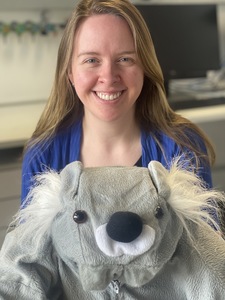Creating a Haptic Empathetic Robot Animal That Feels Touch and Emotion (PhD Thesis Defense)
- Rachael Bevill Burns (Ph.D. Student)
- Max Planck Institute for Intelligent Systems (IMPRS-IS)
Social touch, such as a hug or a poke on the shoulder, is an essential aspect of everyday interaction. Humans use social touch to gain attention, communicate needs, express emotions, and build social bonds. Despite its importance, touch sensing is very limited in most commercially available robots. By endowing robots with social-touch perception, one can unlock a myriad of new interaction possibilities. In this talk, I will present my work on creating a Haptic Empathetic Robot Animal (HERA), a koala-like robot for children with autism. I will demonstrate the importance of establishing design guidelines based on one’s target audience, which we investigated through interviews with autism specialists. I will share our work on creating full-body tactile sensing for the NAO robot using low-cost, do-it-yourself (DIY) methods, and I will introduce an approach to model long-term robot emotions using second-order dynamics.
Biography: Rachael Bevill Burns is a Ph.D. Student Scholar in the International Max Planck Research School for Intelligent Systems (IMPRS-IS). She earned her Bachelor and Master of Science in Biomedical Engineering in 2015 and 2017 at the George Washington University in Washington, D.C., and she joined MPI-IS as a Whitaker International Fellow in 2017. Rachael's research addresses human-robot interaction from multiple angles, including building novel robot tactile sensors, creating believable and intelligent robot emotions, and investigating robot design for target populations. Rachael was a named a 2021 HRI Pioneer and a 2023 RSS Pioneer for her work on HERA.
Details
- 23 February 2024 • 13:00 - 13:45
- Hybrid - Webex plus in-person attendance in N2.025 (MPI-IS Tübingen)
- Haptic Intelligence



